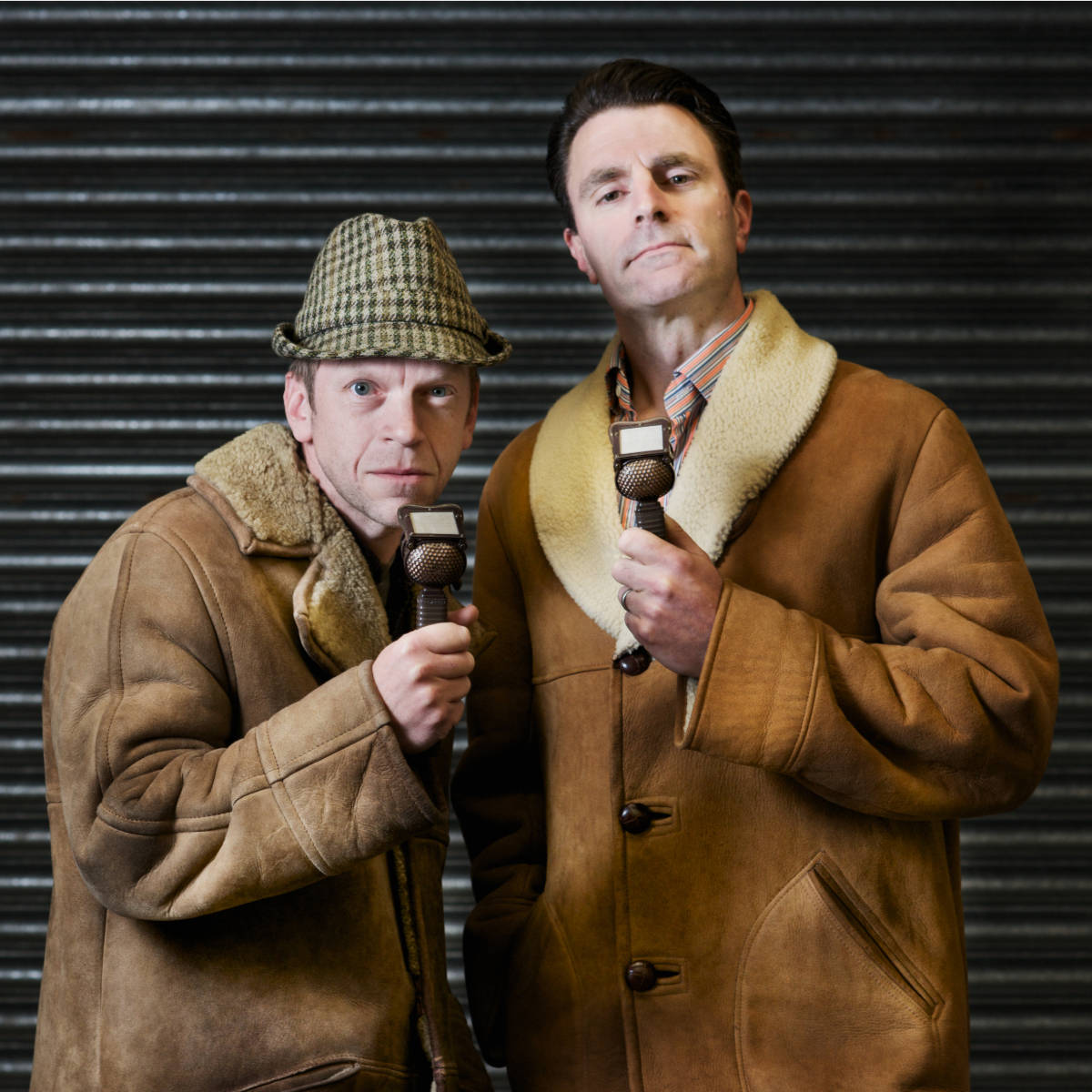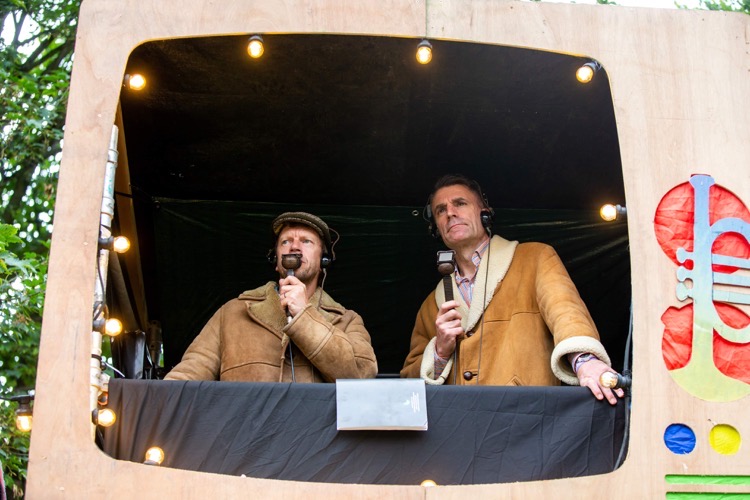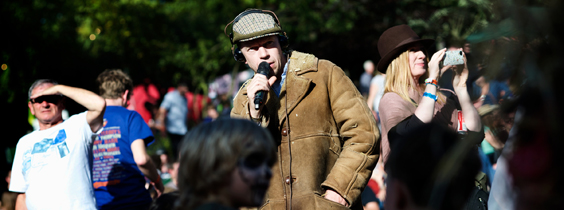
Birth of The Commentators
The Commentators were born almost by accident.
When we took over the vast venue which became @ A E Harris one of the first questions we asked ourselves was “what can we do now that we would never have been allowed to do before” and one of the first answers we came up with was: build a massive Scalextric track. Once you decide on a giant track it stands to reason you need a giant race and the most giant race on a track we could think of is the Le Mans 24 Hour race. So it was agreed we would run a 24 Scalextric race to coincide with the 24 Hour Le Mans race. Our only trouble was working out what made this art rather than just a group of tragic middle aged men who had grown up only enough to get hold of a massive industrial unit, buy a load of Scalextric track off e-bay and stay up all night racing on it. The answer came with The Commentators; if Craig and I delivered an uninterrupted webcast radio commentary on the whole proceedings then THAT would be art.
So we staged 24 Hour Scalextric and to our surprise rather than the commentators truly irritating people, people seemed to truly love the commentators. Data suggested they listened to hours of commentary online, live they asked for the volume on the commentary to be turned up and Tweets backed up our hunches. From this point on it seemed inevitable that The Commentators would return somewhere.
The Commentators’ CV
Our first offer came from Gavin Wade, at Eastside Projects. I don’t recall if we spoke to him about looking for another outing for The Commentators or if it was his idea, but we (actually Graeme and Craig) ended up commentating on a private view for him/them.
Next up Fierce Festival took up the idea. We agreed a series of five commentaries to take place over a week but this got whittled down to just twelve hours 18:00 – 06:00 commentating on the view out of a hotel window almost but not really overlooking Broad Street Birmingham’s busiest strip of nightclubs. In the lead up to this gig a conversation with Fierce Harun Morrison led to the neat idea of The Commentators commentating on a crowd watching a football match with a relay to Warwick Arts Centre‘s Mead Gallery in which the match that our crowd were watching could be seen with our commentary alongside it.
Harun also secured The Commentators their next gig, with AND Festival, commentating on the Egremont Crab and Sports Fair. Where there was no sign of crabs but to compensate the event’s Grand Finale is the World Gurning Championships.
In order to provide a equally grand finale to a year working with Billesley Primary School Craig suggested The Commentators should go to work on their sports day, which they did with aplomb and two radio microphones.
Most recently when Capsule came to us asking if we had any ideas as to what we might contribute to their Discovery Season celebrating the opening of the Library of Birmingham our first through was that it sounded like a job for The Commentators. This seemed to hit the mark and they ended up doing eight hours commentary each day for the library’s first three days in addition to a stint the night before the opening commentating on the pre-opening private function and webcasting this ‘to the world’.
So what?
So rather than being some carefully conceived and precisely executed project The Commentators has evolved and adapted to circumstances and whilst we have reflected on the project we have never subjected it to any systematic interrogation. Until now…
Life as Sport
After the first performance we invented a broad back-story for The Commentators. “They were once fully fledged, successful sports commentators (hence they dress like the iconic John Motson), but now they have fallen on hard times they must accept any commentary job that comes along”.
So far their commissions have split roughly into two strands, those which are very low grade sports commentaries and those which aren’t sports commentaries at all. In the sporting category we have slot cars, not Grand Prix; a crowd watching World Cup football, not World Cup football; it was athletics, but primary school athletics none of whose events resembled any Olympic athletic event; even the Sports Fair contained mostly egg throwing, ferret racing and face pulling (Gurning). Northumberland Wrestling in Egremont was as genuine and high profile a sport as The Commentators have been responsible for commentating on since we’ve known them. Of course because they are sports commentators there is usually a sporting inflection on the commentary even on those occasions where there isn’t even nearly sport around: a gallery opening, a library opening, a mostly deserted street in the night.
The Rules
A few rules have emerged through the commentary. They are always optimistic and never cynical and everything is equally fascinating (though occasionally only to one of them – usually James).
The place of the audience is interesting. The commentaries lie on a spectrum from Broad Street where the commentators were entirely invisible and with their only audience distant and tuned in on-line, through the football crowd and Egremont public, who could see but not hear the commentators, whilst in the openings and scalextric audiences listened both live and on-line. At the sports day, whist the commentators spoke as if they were broadcasting to the world technical constraints (which as with most technical constraints were actually budgetary constraints) prevented the webcast.
In the Library of Birmingham the commentators worked from a pavilion in the Library’s entrance hall. Speakers relayed their commentary beyond the pavilion so it could be heard by the people being commentated upon. A fascinating element of this experience was to watch people’s dawning realisation that they were the subject of the commentary and watching their response to this, which included embarrassed acknowledgement, feigned ignorance, occasional irritation but often great good humour and often acting up for the commentary. There were many who whilst not being commentated upon attempted to do something which would provoke us to mention them.
The commentary is all improvised. Occasionally some preparation has been done to provide some materials to draw upon, but is rare, mostly done by Craig and a script is never written. Some ideas are picked up but fizzle out, some ideas you run with and can be referred back to and become strands and themes. The Library of Birmingham generated its own structure, of each commentator taking one major walk around each day with shared time at the table in between.
At the Library of Birmingham we had to be careful to appear to only ever be commentating for listeners at home when in fact much of what we were saying was for those present at the Library.
Thanks to the mighty Jon Ward a series if ‘highlight’ recordings are being made available online for people to catch up on The Commentators at the Library of Birmingham. You are welcome to listen to them but rather like TV highlights of a five day test match these recordings rather miss the point.
The point of The Commentators isn’t the highlights. The point is the monstrous duration. Eight hours unbroken commentary of something that isn’t conventionally interesting. In this sense the 12 hours through the night at not quite Broad Street was the paradigm commentary.
Whilst performing The Commentators it is difficult to think about anything other than “what’s the other person saying now and what am I going to say next”. That’s the point of it in many ways, what do you say next? You set yourselves the task of commentating on something that appears to be uninteresting and you have committed to do it for a very long time, what the hell do you say next? When you finish performing and reflect on the event then the interesting questions start cropping up.
Why can’t you interview people?
Because it doesn’t work.
Why doesn’t it work?
Because the interviewee is placed in an impossible position, they are real person being asked a question by a fictional commentator, how should they respond? Somehow this Question and Answer moment shorts out the fiction, the interviewee needs to be in role as well.
You are allowed to hint at a back-story (Craig’s garage filled with sports reference books and biographies which could do with the motorized racking system employed by Library of Birmingham), but it feels best only to hint at these rather than getting caught up in a weaving too elaborate a fiction, the less that’s said the more room there is for the audience to project into the gaps.
We have slightly different approaches. Craig is very straight down the line, more disciplined, more funny, I tend to allow myself a longer leash, to go off on more speculative journies of speculation, or over detailed description, or to wander deliberately into awkward cul de sacs that cannot be reversed out of, all safe in the knowledge that Craig, at some point, will cut in with “anyway back to…” As a result Craig’s commentary is very smooth whilst occasionally I feel I’ve overdone something or forced a gag a bit too hard.
One of the keys is that it isn’t supposed to be particularly funny. It’s an absurd premise and fundamentally if there is humour it should stem from that – the absurdity of staring at an empty car park at four in the morning and finding something to say about it.
We’re often asked how we keep going, but in truth the difficulty is stopping. Once you’ve stopped an eight hour shift as a commentator that commentating voice has become internalized and you can’t stand to be with yourself because you’re driving yourself insane and if you dare speak the chances are you’ll drive your partner insane too because you will say too much, give too much information, make an observation that really doesn’t need to be made, unless as you have been for the previous eight hours, you are contracturally obliged to speak.
As boys we commentated on our own football matches or cricket matches either aloud or internally, and when we rode our bikes we were grand prix drivers and when we walked to school we were either still racing drivers or champion walkers and possibly even doing the washing up we were competing in the washing up championships, as 24 Scalextric was a refusal to grow up so the commentators draw on a basic instinct to see sport or competition in everything.
Why do people listen for so long, partly because people do just leave the radio on and don’t listen for so long, but people do say they find it actively difficult to turn off and that is because, unwittingly, we don’t give them permission to turn off, there are no breaks in the commentary, no joins. We never hand over to the news or the sport or the weather or the next program, it is always us and we are always in mid-flow so to turn off would be rude or to miss the end of something that is not finished.
There are probably hints of surveillance, we are CCTV for the radio, the eyes that don’t blink broadcasting for the ears that don’t close.
We have a number of unfulfilled commentary ambitions, but there is still time, The Commentators may not be prolific but they are a long way from retirement.
James Yarker, September 2013




